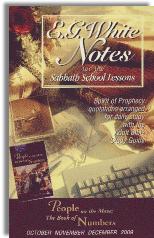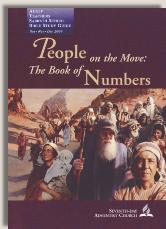|
||||||||||||||
Commentary on "The 'Madness' of the Prophet"
Day 3: Monday, November 30, 2009
This lesson asks, “Who was this Balaam?” Ellen White provided the answer that, “Balaam was once a good man and a prophet of God; but he had apostatized and had given himself up to covetousness…” When Balak’s delegation came to make their offer, Balaam knew what his duty was, and that it was useless to curse Israel. He knew enough about the Lord to make the right decision, and didn’t need to ask God what he should do. However, Balaam opened himself to temptation by asking the King’s delegation to stay and wait for his answer.
When the second invitation from Balak came, Balaam sought another answer from God, and got it. If the men came to call, God told him, go with them, but he was only to do what God said. But Balaam rode out early without waiting for any further invitation.
Observations
The Old Testament never calls Balaam a prophet, but a “diviner” or a “soothsayer”. Only Peter speaks of him as a prophet, where the entire chapter is about false prophets and teachers, and Balaam is given as an especially odious example (II Peter 2). Nowhere does the Bible indicate that Balaam was ever a true prophet or a “good man.”
Balaam inquired of the Lord, but this was not because he was God’s servant. Balaam’s practice of divination included consulting the spirits (“gods”) as to their will. In this case, he needed to demonstrate a relationship with Israel’s God so he could first impress Balak, and later manipulate Yahweh to change Israel’s fortunes. Other gods seemed to change their minds by bribery or flattery, and it is very likely that this is what Balak was hiring Balaam to bring about. It made sense to be familiar with all the gods, in fact, and even to call any one of them “my god,” depending on who his customer was. This is the way of polytheism—having a profitable working relationship with many gods, and trusting none of them.
When the God of Israel does speak to Balaam, the record tells us, “God came to Balaam and asked, ‘Who are these men with you?’” God approaches Balaam on His own terms and asks the questions—Balaam is not in control. God maintains sovereign control throughout the story, controlling Balaam’s actions and words and leaving nothing to chance. At this point, Balaam had enough clues that Israel’s Yahweh was unique.
Divination is defined by its methods of magic or ritual to seek after knowledge or insight from the gods, and often included prophecy. Blessings and curses from the gods were also sought in this way. Pagan religions generally believe that the gods are mysterious and the spiritual world is hidden, so their ways are best known through the artful methods of skilled practitioners. Some diviners believed that they could talk to spirits of the dead, sometimes by digging a hole in the ground or entering a cave (such as the Witch of Endor) through which they would listen for their voices. Balaam practiced the consulting of oracles and omens, which included examining the entrails of animals, the flight of birds, the shaking of arrows, or by lots. A successful diviner like Balaam was not just a trickster. He maintained close communication with the world of demons and obtained his power from them to work signs and wonders.
In 1967, archeologists found ancient inscriptions at Deir Alla, Jordan, containing Balaam’s prophesies. The inscriptions have been dated around 800 B.C., six hundred years after the prophecies were uttered by Balaam. These were not prophecies inspired by the God of Israel, but by other powers working through Balaam, for the pagan nations of that time. The inscription begins with, “The misfortunes of the Book of Balaam, son of Beor. A divine seer was he.” Balaam had a vision of a great goddess coming to cover the world with darkness and destroy it.
Balaam’s experiences and messages were diametrically opposed to those of God’s true prophets, who never prophesied for money, never made a prophecy that wasn’t accurate, and never engaged in occult practices or sought the will of other gods. Balaam was an enemy of the God of Jacob and would be stopped.
Summary
- The Bible never refers to Balaam as a true prophet or a good man, but only as a diviner, a soothsayer, and a false prophet.
- Balaam did not seek God’s answers because he was God’s servant, but because he wished to manipulate Him. Balaam knew about God only as a polytheist.
- These methods are in contrast with how God came to Balaam, on God’s terms and under His control. This demonstrates the pattern of how we approach God.
- Balaam practiced divination to obtain secret knowledge from the spirit world for purposes of prophecy, blessings and curses. His power came from demons.
- Balaam was well known in the region as a “divine seer” who spoke with the gods, as we find from an archeology discovery in Jordan.
- Balaam’s experiences and messages were opposite to those of a true prophet.
GO TO DAY 4
Copyright 2009 BibleStudiesForAdventists.com. All rights reserved. Revised November 28, 2009. This website is published by Life Assurance Ministries, Glendale, Arizona, USA, the publisher of Proclamation! Magazine. Contact email: BibleStudiesForAdventists@gmail.com.
The Sabbath School Bible Study Guide and the corresponding E.G. White Notes are published by Pacific Press Publishing Association, which is owned and operated by the Seventh-day Adventist church. The current quarter's editions are pictured above.
Official Adventist Resources
Standard Edition Study Guide Week 10
Teacher's Edition Study Guide Week 10
Easy Reading Edition Study Guide Week 10
Search the Complete Published Ellen G. White Writings


